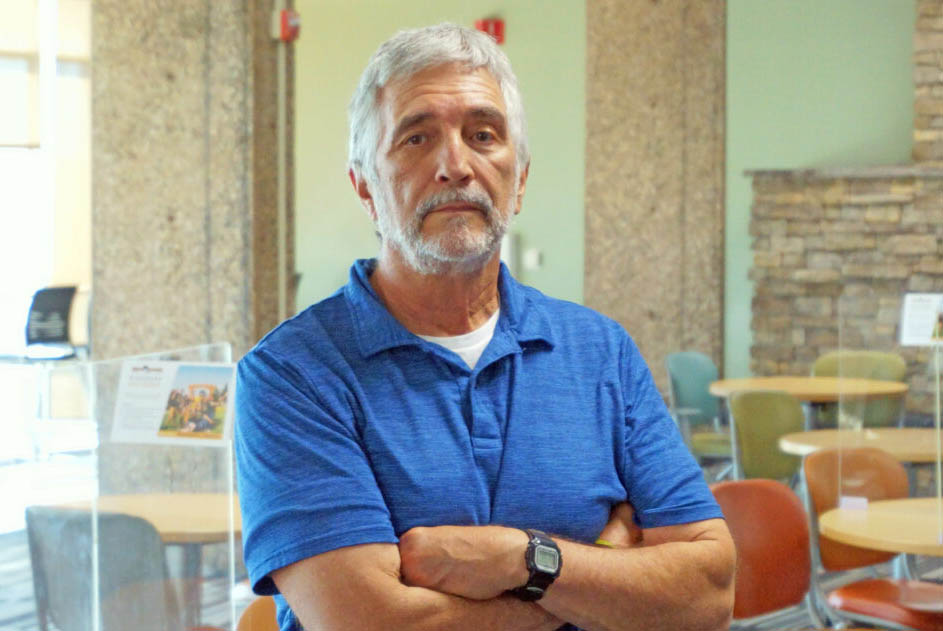 Credit: Andrew Reed / EdSource
Credit: Andrew Reed / EdSourceSeven part-time community college professors across California have sued eight local districts where they teach and the state, claiming their job requires that they work unpaid hours preparing lessons, grading and meeting with students, court records show.
They are demanding back pay, changes that will ensure they are paid for the work in the future, and for a judge to declare the suit a class action that could sweep in other part-time academics, commonly called adjuncts. As many as 37,000 adjuncts teach in the 115 colleges.
The lawsuit, filed Monday in Sacramento Superior Court, mirrors allegations made in a similar suit against Long Beach City College that adjuncts filed in April, claiming a lack of pay for work done outside of teaching hours. The Long Beach suit remains in the preliminary stages, Los Angeles Superior Court records show. But while the Long Beach suit focuses only on one community college district, the suit filed Monday has statewide reach and names the state California Community College system as a defendant.
The “plaintiffs have not been paid for all their hours of work outside of class to prepare their lectures or labs, grade papers and exams, prepare syllabi, email with or talk to their students, and assist in essential departmental activities,” the suit claims. “California state law does not permit employers to take advantage of employees by not paying them for all hours worked.”
“It’s been a long time brewing,” the lead plaintiff, John Martin, chairman of the California Part-time Faculty Association, said in an interview Monday. His intention is to “up the ante and put the pressure on the districts. This is another tool.”
Martin is named in the suit as specifically suing the Shasta-Trinity-Tehema Joint Community College District, where he teaches history. If a judge classifies the suit as a class action, he would represent a class of part-timers at that school. The other plaintiffs would represent classes of part-time faculty at their districts.
The other districts named in the suit are Butte-Glenn, San Diego, Mt. San Jacinto, Los Rios, Yuba, Los Angeles and Cerritos. Spokespersons for the districts either did not respond to requests for comment or said their districts have yet to be served with the suit. Of the 73 districts statewide, the Los Angeles Community College District is the largest with eight colleges and nearly 120,000 students.
A spokesman for the state community college system said the suit has not been served there and declined to comment.
The lead attorney for the plaintiffs, Daniel Galpern, wrote in the complaint that the system was named as a defendant because it “is a part of the California state government that oversees, sets policy and provides guidance for the California community college districts.” It “directly plays a role in being the liaison between community college districts across the state and the Legislature.” It plays “a policy implementing role, was responsible for and/or was aware” that adjuncts are not paid for work outside the classroom, the suit claims.
Adjuncts work semester by semester with little to no job security, especially as pandemic-driven enrollment drops are costing jobs. EdSource reported in February in a three-part-investigative series on their working conditions that adjuncts make up 70% or more of all faculty at 35 districts and that at only two districts do full-time faculty outnumber them.
They are paid hourly for classroom time, and sometimes for office hours, often at a rate less than teaching hours. But the need for hours to prepare and grade is not acknowledged, adjuncts claim.
Yet district and state officials know “that such outside-of-classroom work is essential to their part-time professors’ teaching effectiveness and imposes criteria and evaluations as to which this work is integral.” The districts named as defendants have “benefited from the uncompensated work of their part-time faculty,” the suit claims.
“The problem has been ongoing and apparently is not getting any better,” Galpern told EdSource on Monday. ‘It’s a question of fundamental justice.”
To get more reports like this one, click here to sign up for EdSource’s no-cost daily email on latest developments in education.


Comments (5)
Comments Policy
We welcome your comments. All comments are moderated for civility, relevance and other considerations. Click here for EdSource's Comments Policy.
Nick 7 months ago7 months ago
Professionals who more than provide work, but accept ownership of a problem, are best compensated and motivated by an entrepreneurial model. You don’t hire a lawyer or surgeon like an hourly laborer, you contract with the law firm or medical practice of which they may be a partner. Which is how the teaching profession has historically been accomplished. In academia, that partnership is called tenure. Tenure isn’t a gift, it’s earned by years of … Read More
Professionals who more than provide work, but accept ownership of a problem, are best compensated and motivated by an entrepreneurial model. You don’t hire a lawyer or surgeon like an hourly laborer, you contract with the law firm or medical practice of which they may be a partner.
Which is how the teaching profession has historically been accomplished. In academia, that partnership is called tenure. Tenure isn’t a gift, it’s earned by years of contribution and dedication. Tenure links your future to the future of your program and school. Tenure is when you are accepted as a senior partner in the school. Creating that sense of responsibility and ownership of the challenges and future of your program.
Many of the problems of modern education exist because we are doing away with tenure. Disinvesting even the most passionate teachers from the process and reducing them to delivering instruction (labor), instead of professing (advocating, teaching, inspiring commitment in) a discipline.
Students and society are losing faith in higher education. Because the folks we have traditionally relied on to spark passion and inspiration, who model the potential and strength of a discipline, the people who care—they have been cut out of the loop by adjunctification and deprofessionalization. This isn’t a fight for fair treatment of teachers. This is a fight for the survival of higher education.
Replies
John Martin 7 months ago7 months ago
These lawsuits aren’t about tenure, they’re about fair compensation for work outside of the classroom/contact hours with students. Free work, mandatory work, is against the law.
Nick 7 months ago7 months ago
Work is moving things. Literally, force (effort) applied by distance moved. Teaching is more than work. We are reducing the issue to how many hours laboring (trading work for wage) should be recognized. This hides the greater problem that either adjuncts are not compensated for the more than work teaching requires—or that teaching is not expected to happen. Contributions beyond labor justify equity (stake) in what is built. Tenure is recognizing … Read More
Work is moving things. Literally, force (effort) applied by distance moved. Teaching is more than work.
We are reducing the issue to how many hours laboring (trading work for wage) should be recognized. This hides the greater problem that either adjuncts are not compensated for the more than work teaching requires—or that teaching is not expected to happen.
Contributions beyond labor justify equity (stake) in what is built. Tenure is recognizing equity in a program. By letting tenure slip away while leaning into the model that teaching is only labor, faculty are quietly quitting on our schools.
These actions are not addressing tenure. They should.
Terry Givens 7 months ago7 months ago
Thank you for the update on the California community college class action law suit. I did want add that we are also are required to do hours of required online training on our own unpaid time.
Tim Morgan 7 months ago7 months ago
The real mistake here is paying college-level instructors like hourly laborers. The historical distinction between professionals and others whose work is best compensated by a monthly salary, and hourly workers filling time slots or manufacturing widgets, has been sacrificed by the arrogance of Silicon Valley “libertarianism” and the idea, pushed by ride-share services, who view the classification of a job as a subject for litigation and contract, rather than law.